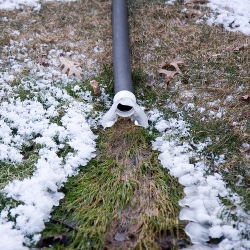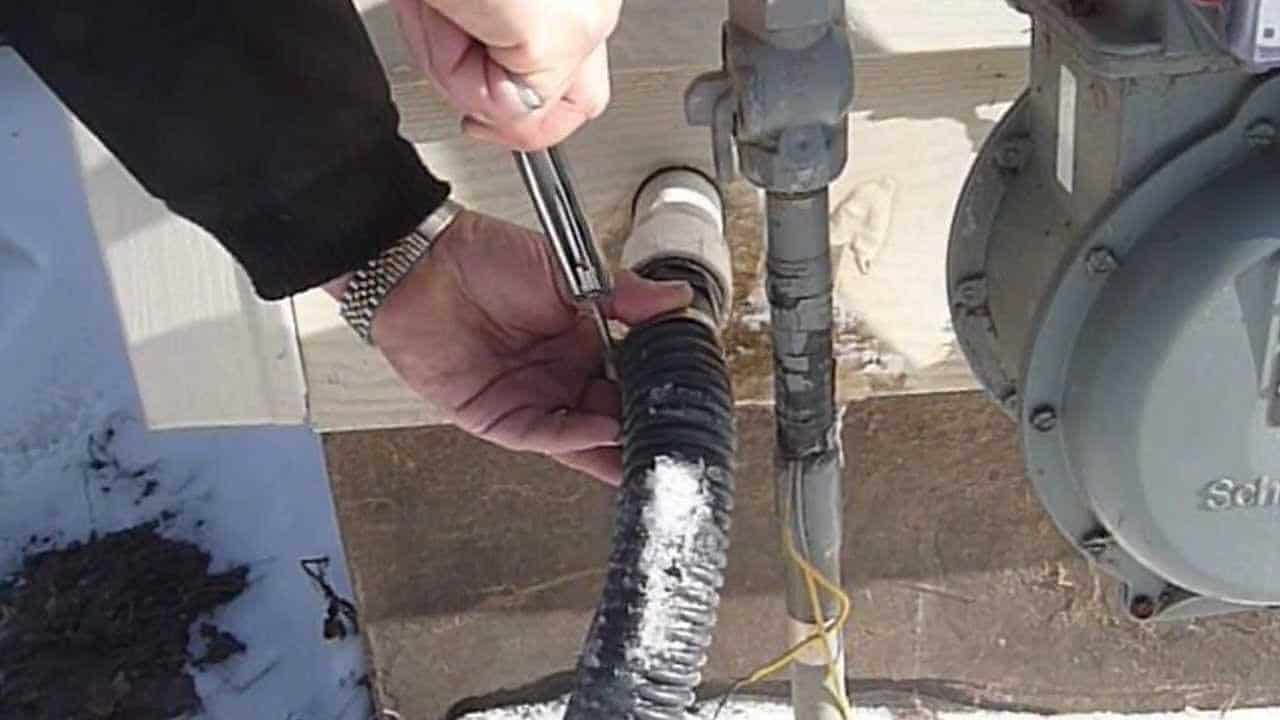Can a Sump Pump Freeze
Sump pumps are designed to remove water from your home, but they can’t do their job if they’re frozen. A sump pump can freeze for a number of reasons, including improper installation, lack of maintenance, and extreme weather conditions.
If your sump pump does freeze, it’s important to take action quickly to prevent further damage to your home. If you live in an area where temperatures can dip below freezing, you might be wondering if your sump pump can freeze.
The answer is yes, a sump pump can freeze. If the water in your sump pit freezes, it will no longer be able to do its job of pumping water out of your basement or crawlspace.
This could lead to flooding and other damage in your home. There are a few things you can do to help prevent your sump pump from freezing.
First, make sure that the pit is properly insulated. You can add insulation to the walls of the pit or use a floating cover designed for sump pits.
Second, keep the lid to the pit closed as much as possible. Third, if you know that temperatures are going to dip below freezing, try to keep the temperature in your home above 55 degrees Fahrenheit. By taking these steps, you can help reduce the risk of your sump pump freezing and failing when you need it most.
Can My Sump Pump Discharge Lines Freeze?
Sump Pump Freeze Guard
If you live in an area that gets cold enough to freeze, then you know the importance of having a sump pump. But did you know that your sump pump is susceptible to freezing? That’s why it’s important to have a sump pump freeze guard.
A sump pump freeze guard is a device that is installed on your sump pump to prevent it from freezing. It works by circulating warm air around the sump pump, keeping it at a temperature above freezing.
This way, even if the temperature outside dips below freezing, your sump pump will be protected and will continue to work properly. There are a few different types of sump pump freeze guards available on the market.
Some are standalone units that can be placed next to your sump pump, while others are integrated into the design of the sump pit itself. No matter which type you choose, a sump pump freeze guard is an essential piece of equipment for any home in a cold climate.
Sump Pump Freeze Guard Lowe’S
When the weather outside is frigid, the last thing you want is for your sump pump to freeze. A frozen sump pump can cause your basement to flood, leading to expensive repairs.
Fortunately, there is a simple solution – a sump pump freeze guard. A sump pump freeze guard is a device that attaches to your sump pump and prevents it from freezing.
It works by circulating warm air around the pump, keeping it at a temperature above freezing. This way, even if the temperature outside dips below freezing, your sump pump will continue to work properly.
A sump pump freeze guard is an inexpensive way to protect your home from flooding during cold weather. If you live in an area where temperatures regularly dip below freezing, consider investing in one of these devices. You’ll be glad you did when your basement stays dry all winter long!
Sump Pump Air Gap
A sump pump air gap is a device that helps to prevent backflow from a sump pit into the home. It is typically installed in homes with a basement or crawl space, and it works by allowing air to enter the sump pit through a small opening.
This air then creates a barrier between the water in the pit and the home’s foundation, which helps to keep water from seeping into the home. Sump pump air gaps are an important part of any home’s flood prevention system, and they can be installed by a qualified plumber or contractor.
Sump Pump Dry Well Freezing
If you live in an area that gets cold in the winter, you may be wondering if your sump pump dry well will freeze. While it is possible for the well to freeze, there are a few things you can do to prevent this from happening.
First, make sure that the well is properly insulated. This will help to keep the temperature inside the well above freezing.
You can insulate the well yourself or hire a professional to do it for you. Second, keep the lid of the well closed when it is not in use.
This will help to keep out any cold air that could cause the well to freeze. Third, if you do find that your sump pump dry well has frozen, don’t panic! Simply thaw it out using a hair dryer or other similar device. Once thawed, your pump should work as normal.
Outdoor Sump Pump
An outdoor sump pump is a submersible pump that is used to remove water that has accumulated in a sump pit. This type of pump is typically used in basements or crawlspaces where flooding may occur. Outdoor sump pumps are designed to be durable and weather-resistant, so they can be used in any climate.
How to Store a Used Sump Pump
If you have a used sump pump that you need to store, there are some things that you need to do in order to ensure that it is stored properly. Here are some tips on how to store a used sump pump: 1.
Make sure that the sump pump is clean before you store it. Any dirt or debris on the pump can cause damage during storage.
2. Wrap the sump pump in a heavy-duty plastic bag.
This will help protect it from dust and moisture. 3.
Store the sump pump in a cool, dry place. Avoid storing it in an area where temperatures can fluctuate, such as a garage or shed.
4. Check on the sump pump periodically during storage to make sure that it is still clean and dry. If you notice any signs of damage, don’t use the pump and contact a professional for assistance.
How to Pipe Sump Pump Outside
If your home is in an area that is prone to flooding, you may want to consider installing a sump pump. A sump pump is a device that pumps water out of your basement or crawlspace and away from your home.
One way to install a sump pump is to pipe it outside. This can be done by running a PVC pipe from the sump pit to an area outside of your home where the water can drain away.
It is important to make sure that the pipe slopes down so that the water will flow out of the pit and not back into it. You also need to make sure that there are no bends or kinks in the pipe so that the water can flow freely.
If you are not comfortable doing this yourself, you can hire a plumber to do it for you. Be sure to ask them about any warranty they offer on their work.

Credit: www.reliablebasement.com
What Happens If Your Sump Pump Freezes?
If your sump pump freezes, it will no longer be able to pump water out of your basement. This can lead to flooding and serious damage to your home. To prevent your sump pump from freezing, make sure that it is properly insulated and that the area around it is free of ice and snow.
How Do You Unfreeze a Sump Pump?
If your sump pump has frozen, there are a few things you can do to unfreeze it. First, try running hot water over the pump for a few minutes.
If that doesn’t work, you can remove the pump from the sump pit and thaw it out with a hair dryer. Once the pump is thawed, put it back in the pit and make sure the discharge pipe is not frozen. You may need to use an ice pick or other sharp object to break up any ice that has formed in the pipe.
Can Sump Pumps Freeze in the Winter?
As temperatures drop in the winter, the potential for your sump pump to freeze increases. While most pumps are built to withstand cold weather, if the water in your pump freezes it can cause serious damage.
If you’re worried about your pump freezing, there are a few things you can do to help prevent it. First, make sure that your sump pit is properly insulated.
This will help keep the temperature inside the pit from getting too low and causing the water to freeze. You can insulate the pit with foam insulation or by covering it with a lid.
If you live in an area that gets very cold in the winter, you may want to consider investing in a backup power source for your sump pump. This could be a battery-operated backup pump or a generator.
If your primary pump does freeze, having a backup will ensure that your basement stays dry. Finally, if you know that temperatures are going to dip below freezing, it’s a good idea to run your sump pump periodically throughout the day. This will help keep any water that does accumulate from freezing and damaging your pump.
How Do I Keep My Outside Sump Pump from Freezing?
If you have an outside sump pump, there are a few things you can do to keep it from freezing. First, make sure that the area around the pump is well-insulated.
This will help to keep the heat in and the cold out. You can also use a heater tape or a heat lamp to keep the area around the pump warm.
Another thing you can do is to regularly check the temperature of the water in your sump pit. If it starts to get too cold, you can add some antifreeze to the water to help prevent it from freezing.
Finally, if your outside sump pump does freeze, don’t try to thaw it out with a blow torch or any other type of direct heat source. Doing so could damage the pump beyond repair. Instead, slowly thaw it out by using a hair dryer set on low or by placing it in a bucket of warm water.
Conclusion
If you live in an area that gets cold enough for your sump pump to freeze, there are a few things you can do to prevent it from happening. First, make sure the pump is well insulated.
You can also add a heating element to the sump pit to keep the water from freezing. If your pump does freeze, thaw it out as soon as possible so it doesn’t damage the pump.

